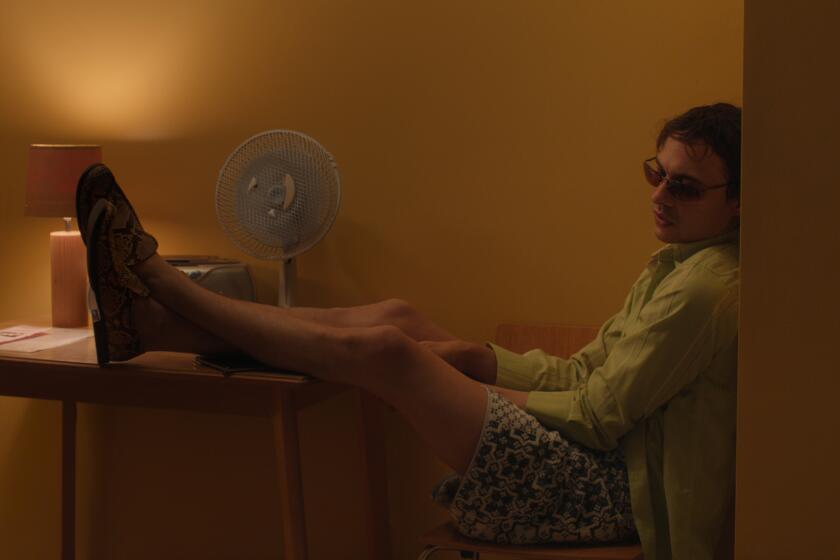At Iraqi cinema, a flashback to better times
- Share via
BAGHDAD — A passerby lingers over a poster of a scantily clad woman but then keeps on walking past the penitentiary-style metal bars of the Atlas movie theater. Back when Saadoun Street was bustling, the pictures of a man nibbling on a woman’s neck would bring in the crowds. But now trash blows by and a bald man in a booth with matching metal bars fights off boredom waiting to sell the stacks of tickets.
Inside, the Atlas’ manager, Saad Hashim, sits behind a desk, his wall decorated with the smiling face of a Syrian pop singer. He talks on the phone with his fist thrust out and his glasses perched on his creased forehead.
The white-haired Hashim has managed movie houses for 39 years, since he was 16 and needed a job to put himself through school. At times, he had harbored dreams of becoming a cinematographer, but that never panned out. (He says it was because he was a Shiite Muslim living in Saddam Hussein’s Sunni-led Iraq.)
Whatever the reasons, the movies still enthrall him.
“When I watch a film I like, I forget everything around me. . . . I’m not ready to stop watching it to do any kind of work . . . or to talk to somebody!” Hashim says.
He talks proudly of the old moviegoers. “They were educated people: officers, officials from government offices, students,” he says. Families and “important figures in society” would book reservations by phone, he says. He paid extra attention to them and was always on call. When they arrived, Hashim would send an usher to escort them in. But he always insisted that they hand in any weapons for safekeeping because pistols were banned from the theater.
Today, hours move slowly at work. He speaks dismissively of those who come to his theater now; they only want to see films that might show a hint of a woman’s flesh, he says.
“They are uneducated people. They know nothing about cinema. They don’t care for a film’s theme. They want to pass the time and see some shots of women’s bodies,” Hashim says.
He remembers when crowds would line up at the ticket window. It didn’t matter if the movie was old, which was all he could get back in the 1990s, when the Baghdad film industry was hobbled by international sanctions.
Hashim brought films that would run for a month, and could be held over if they proved popular -- anything from “Rambo” to a romantic comedy or Bollywood films from India. Hashim would organize an advertising campaign. He would send young men walking or driving down streets shouting about the movie. “ ‘Sasco’ is the best film,” his hawkers once cried about a Bollywood film popular with Baghdadis in the late 1970s.
Once there was an Egyptian film called “We Don’t Plant Thistle” that enjoyed a 15-week run and proved so popular that families brought hot plates to the theater’s garden to cook food while they waited their turn to see the film.
He lists a stream of films he fell in love with over the years: “Spartacus” in 1960 starring Kirk Douglas as a slave who leads a revolt against the Roman Empire; a film about Che Guevara; and the 1969 Greek political thriller “Z.”
Before the 2003 invasion, Baghdad had 40 cinemas; now there are only eight. In those days, the theaters opened at 8 a.m. and closed just before midnight. Today, the theaters shut at 1 p.m. Hashim says only the riffraff and lowlifes frequent his theater.
He breezes over his complicity by providing viewers with the “racy” scenes and “sexy” shots not readily available under Hussein’s tight censorship. Other theaters have closed rather than cater to the new market -- the owners of the now-shuttered Nujoom (Star) cinema described their clientele after 2003 as “drug addicts, alcoholics and freaks.”
The risque fare has drawn ire from Islamist parties, who make occasional threats against theaters.
“Some people, we don’t know from which movements, came several times to the cinema and gave their advice and orders. They don’t want the sexy films . . . and then, it was agreed with them to black out the sensitive body parts,” Hashim says.
But the censorship was too much for him. He couldn’t bear the blacked-out image on the screen.
“When I saw that, I decided to quit the job I loved,” he says. Hashim told people he had received a visa to travel to Europe, but he actually hid in his house for a year. “When things got better, I returned back to my job,” he says.
Hashim believes cinema should perform an educational role in society, uplifting the people. He puzzles over the difference between Iraq and neighboring Iran, where clerics rule.
“Iran is an Islamic country . . . and the cinema there has developed,” Hashim says “They are producing films that are competing for world prizes! The religion doesn’t ban the cinema.”
Once more, he heaps scorn on his patrons.
“We are suffering from some people who don’t understand cinema’s role. They don’t care for social films, worldly novels or other themes.”
Recently, a delegation from the Baghdad city council told Hashim that the government wanted to supply several theaters with new projectors, sound systems and seats as part of a plan to develop the film industry.
If the government comes through, perhaps Hashim could hope for a movie renaissance in Baghdad.
Perhaps. He sighs.
“I feel too sad when I know that a cinema has closed down and changed into a forlorn place.”
--
Times staff writer Ned Parker contributed to this report.
More to Read
Only good movies
Get the Indie Focus newsletter, Mark Olsen's weekly guide to the world of cinema.
You may occasionally receive promotional content from the Los Angeles Times.










